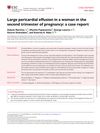 3 citations,
July 1996 in “Clinics in Dermatology”
3 citations,
July 1996 in “Clinics in Dermatology” Cytokines are important for immune responses and treating diseases, but they can cause side effects like fever and skin issues.
 May 2023 in “Journal of Investigative Dermatology”
May 2023 in “Journal of Investigative Dermatology” Blocking DPP4 can potentially speed up hair growth and regeneration, especially after injury or in cases of hair loss.
 7 citations,
July 2011 in “Survey of Ophthalmology”
7 citations,
July 2011 in “Survey of Ophthalmology” The document concludes that periocular hair disorders have various causes and treatments, and proper evaluation by specialists is important for management and prognosis.
[object Object]  June 2021 in “Research Square (Research Square)”
June 2021 in “Research Square (Research Square)” Adverse events in lung cancer treatments increase fear, anxiety, and depression, with newer therapies causing fewer side effects.
 42 citations,
April 2021 in “Journal of clinical pharmacology”
42 citations,
April 2021 in “Journal of clinical pharmacology” Baricitinib helps treat several diseases, including COVID-19, but has side effects and needs careful monitoring.
 March 2010 in “Anti-inflammatory & anti-allergy agents in medicinal chemistry”
March 2010 in “Anti-inflammatory & anti-allergy agents in medicinal chemistry” Biologic agents can be effective for rheumatic diseases but have risks like infections and require careful monitoring and patient information.
 December 2023 in “Regenerative therapy”
December 2023 in “Regenerative therapy” miRNA-based therapies show promise for treating skin diseases, including hair loss, in animals.
2 citations,
December 2023 in “Pharmaceutics” Inhaling medicine may reduce side effects and improve treatment for a major lung cancer type.
January 2025 in “Pharmaceuticals” Peptide-based hydrogels are promising for healing chronic wounds effectively.
9 citations,
May 2022 in “Frontiers in Cellular Neuroscience” Mesenchymal stromal cell therapies show promise for treating various diseases but need more research and standardization.
 369 citations,
June 2013 in “Biochimie”
369 citations,
June 2013 in “Biochimie” Myo-inositol supplements may improve insulin sensitivity and help with conditions like PCOS and gestational diabetes, but more research is needed.
January 2025 in “PROTEOMICS” Drug repositioning is a promising way to quickly develop new treatments, especially for rare diseases.
 December 2004 in “Medicine”
December 2004 in “Medicine” A thorough history and examination are crucial for diagnosing skin diseases, which affect up to a third of people. This includes details about skin lesions, medication, general health, lifestyle, family, and contacts, as well as examining the rash, hair, nails, and mucous membranes. Changes in hair and nails can also indicate other medical and skin disorders.
 80 citations,
April 2018 in “Trends in Molecular Medicine”
80 citations,
April 2018 in “Trends in Molecular Medicine” Lichen Planopilaris and Frontal Fibrosing Alopecia may help us understand hair follicle stem cell disorders and suggest new treatments.
 119 citations,
October 1992 in “Fundamental & Clinical Pharmacology”
119 citations,
October 1992 in “Fundamental & Clinical Pharmacology” Potassium channel openers could help treat cardiovascular diseases and asthma but require better targeting to specific tissues for effective use.
 May 2024 in “International journal of nanomedicine”
May 2024 in “International journal of nanomedicine” Plant-derived extracellular vesicles show promise for treating diseases like cancer and inflammation.
15 citations,
December 2021 in “Pharmaceutics” The study found key factors in the cause of hidradenitis suppurativa, its link to other diseases, and identified existing drugs that could potentially treat it.

Hair analysis can help identify specific minerals and amino acids linked to various diseases.
 54 citations,
January 2023 in “Signal Transduction and Targeted Therapy”
54 citations,
January 2023 in “Signal Transduction and Targeted Therapy” New therapies are being developed that target integrin pathways to treat various diseases.
665 citations,
April 2016 in “Nature communications” Blocking specific proteins can help remove aging cells and might treat age-related diseases and promote hair growth.
 April 2024 in “The Journal of experimental medicine/The journal of experimental medicine”
April 2024 in “The Journal of experimental medicine/The journal of experimental medicine” Treg cells help repair and regenerate tissues by interacting with local cells.
 17 citations,
February 2011 in “Expert Opinion on Drug Safety”
17 citations,
February 2011 in “Expert Opinion on Drug Safety” Manage side effects of hepatitis C treatment with dose changes and medications, which may improve patient adherence and treatment success.
 February 2024 in “European heart journal. Case reports”
February 2024 in “European heart journal. Case reports” Early surgical intervention and a multidisciplinary approach are crucial for managing complex cardio-obstetric patients.
[object Object]  3 citations,
January 2024 in “Signal transduction and targeted therapy”
3 citations,
January 2024 in “Signal transduction and targeted therapy” Lymphatic vessels are essential for health and can be targeted to treat various diseases.
 43 citations,
February 2019 in “International immunology”
43 citations,
February 2019 in “International immunology” Special immune cells called Regulatory T cells help control skin inflammation and repair in various skin diseases.
 1 citations,
June 2023 in “Nutrients”
1 citations,
June 2023 in “Nutrients” Vitamin D deficiency is linked to a higher chance of metabolic syndrome in women with PCOS.
 June 2023 in “Frontiers in Cardiovascular Medicine”
June 2023 in “Frontiers in Cardiovascular Medicine” Using existing drugs for new purposes could be a cost-effective way to treat chest pain and non-clogged heart arteries, with some drugs for lung blood pressure showing promise but needing more testing.
 February 2012 in “InTech eBooks”
February 2012 in “InTech eBooks” PCOS increases the risk of heart disease and type 2 diabetes in women.
 12 citations,
August 2022 in “Biochemical Journal”
12 citations,
August 2022 in “Biochemical Journal” Different types of cell death affect skin health and inflammation, and understanding them could improve treatments for skin diseases.
 30 citations,
January 2023 in “EFSA journal”
30 citations,
January 2023 in “EFSA journal” Adults should not consume more than 255 micrograms of selenium per day to avoid risk of hair loss and other side effects.
























